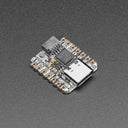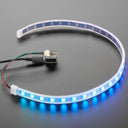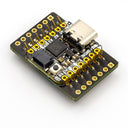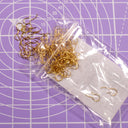Adafruit QT Py - SAMD21 Dev Board
by Adafruit







What a cutie pie! Or is it... a QT Py? This diminutive dev board comes with our favorite lil chip, the SAMD21 (as made famous in the GEMMA M0 and Trinket M0 boards).
This time it comes with our favorite connector - the STEMMA QT, a chainable I2C port that can be used with any of our STEMMA QT sensors and accessories.
OLEDs! Inertial Measurment Units! Sensors a-plenty. All plug-and-play thanks to the innovative chainable design: SparkFun Qwiic-compatible STEMMA QT connectors for the I2C bus so you don't even need to solder! Just plug in a compatible cable and attach it to your MCU of choice, and you’re ready to load up some software and measure some light.
Pinout and shape is Seeed Xiao compatible, with castellated pads so you can solder it flat to a PCB. In addition to the QT connector, Adafruit also added an RGB NeoPixel (with controllable power pin to allow for ultra-low-power usage), and a reset button (great for restarting your program, or entering the bootloader)
Runs Arduino like a dream, and can be used for basic CircuitPython projects. For more advanced usage like datalogging or file storage, solder an SOIC SPI flash chip onto the bottom pads,
- Same size, form-factor, and pin-out as Seeed Xiao
- USB Type C connector - If you have only Micro B cables, this adapter will come in handy!
- ATSAMD21E18 32-bit Cortex M0+ - 48 MHz 32 bit processor with 256KB Flash and 32 KB RAM
- Native USB supported by every OS - can be used in Arduino or CircuitPython as USB serial console, MIDI, Keyboard/Mouse HID, even a little disk drive for storing Python scripts.
- Can be used with Arduino IDE or CircuitPython
- Built in RGB NeoPixel LED
- 11 GPIO pins:
- True analog output on one I/O pin - can be used to play 10-bit quality audio clips in Arduino (CircuitPython does not have storage for audio clips)
- 9 x 12-bit analog inputs (SDA/SCL do not have analog inputs)
- 1 x Optional AREF on A1
- 9 x PWM outputs (A0 is analog out, A1 is not PWM capable)
- Hardware I2C port with STEMMA QT plug-n-play connector
- Hardware UART
- Hardware SPI
- Hardware I2S
- 6 x Capacitive Touch with no additional components required
- 3.3V regulator with 600mA peak output
- Optional SOIC-8 SPI Flash chip on bottom
- Reset switch for starting your project code over or entering bootloader mode
- Really really small
-
Adafruit QT Py - SAMD21 Dev Board
ADA460010% off!£6.30was £7.00
Useful extras
-
 Adafruit NeoPixel Driver BFF Add-On for QT Py and Xiao+ £3.15
Adafruit NeoPixel Driver BFF Add-On for QT Py and Xiao+ £3.15 -
 FlexyPin Adapter – Xiao/QTPy+ £0.90
FlexyPin Adapter – Xiao/QTPy+ £0.90 -
 FlexyPin - Pack of 100+ £5.00
FlexyPin - Pack of 100+ £5.00
Shop with confidence – we've been serving the hobbyist electronics, Maker, and retro gaming communities since 2012.
- Satisfaction or refund guarantee
- Worldwide shipping via mail or courier
- 57,000+ customer reviews
- Secure website and payments


